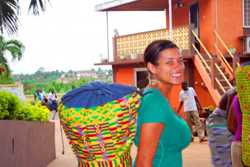More Than Just 'Jet Lag'

Kelly Granger in Ghana with her djembe, a traditional Ghanian drum made from carved wood and goatskin.
Kelly Granger had just finished her first year at Davidson College in North Carolina in May 2010 when she had the chance to take her love for her anthropology major beyond the classroom setting. Kelly had signed up for Davidson’s six-week program in Ghana, which aims to immerse students in modern and traditional Ghanaian life through courses, a service project, and excursions to different parts of the country. Doctors at the clinic at Kelly’s college had prescribed her a course of malaria prophylaxis, which Kelly took when she was in Ghana. Kelly’s parents were thrilled to pick up their daughter at the airport in New York on July 3, after her six-week trip to Ghana, and the Grangers were excited to spend some time together as a family. Little did they know about the extent of the drama that would unfold in the next two weeks.
Missed Diagnosis
About five days after her return to the US, Kelly started feeling more tired and complaining of headaches and occasional fevers. Her pediatrician said that since she had taken mefloquine prophylaxis for malaria, her symptoms were probably just jet lag. He advised her to return in a week if she was still ill. Two days later, however, Kelly’s fever spiked and she developed hallucinations and chills. When Kelly’s younger sister asked, “Who is Kelly talking to?” when no one was in the room with Kelly, her mother knew that something was seriously wrong. Her parents took her right away to Cohen Children’s Medical Center on Long Island, where the triage nurse recognized the urgency of the situation. The staff hooked her up to IVs and began running several tests to diagnose her illness. The emergency room staff noticed that Kelly was jaundiced, not just tanned from the African sun.
Help is Available
The hospital laboratory found that Kelly’s blood had high levels of Plasmodium falciparum malaria parasites. She was severely anemic as well, because the parasites had destroyed many of her red blood cells. Kelly had to be admitted to the Pediatric Intensive Care Unit and she was started on intravenous treatment for severe malaria: IV quinidine and doxycycline. A team of infectious disease doctors, nurses, hematologists, and other specialists discussed the best approach to treating Kelly’s severe malaria. The team consulted the CDC’s malaria treatment guidelines (available at: http://cdc.gov/malaria/diagnosis_treatment/index.html) and the infectious diseases fellow called CDC’s malaria hotline for clinicians (770-488-7788 from Monday through Friday, 9am–5pm or 770-488-7100 on nights and weekends). Over the course of the next critical hours, the consulting clinician at CDC helped guide the treatment and care that the hospital team was providing to Kelly.
Despite the excellent care Kelly was receiving from the team of specialists at Cohen Children’s, her condition was deteriorating rapidly due to the delay in the initial malaria diagnosis. She started having hallucinations again, a temperature of 105 degrees Fahrenheit, and began slipping in and out of consciousness. The parasitic load in her bloodstream had increased from 15–20% upon admission to the hospital to an extremely high 40% early the following morning. It was clear that Kelly needed more aggressive treatment for her very severe malaria. A CAT scan was performed to rule out bleeding in Kelly’s brain.

Dr. Suchitra Acharya, the hematologist at Cohen Children’s Medical Center who initiated Kelly’s exchange transfusion to reduce the level of malaria parasites in her blood.
About 24 hours after Kelly was admitted to the pediatric intensive care unit, doctors specializing in blood diseases prepared her for an exchange transfusion, whereby her red blood cells, many of which were infected with malaria parasites, would be removed through an IV in one arm and fresh red blood cells from blood donors would be transfused into Kelly’s other arm. Luckily, this treatment was able to rapidly bring down the level of malaria parasites in Kelly’s blood, and she regained consciousness after three hours. Her parents breathed a huge sigh of relief when she woke up and said, “Hi, Daddy”. The clinicians could see the result of their life-saving care—and Kelly’s inherent charm—when the attending infectious diseases physician asked if she knew who he was and Kelly responded, “The handsome doctor who saved my life?”
After Kelly regained consciousness, she was extremely weak from the parasites invading her body. She did some physical therapy and was well enough to be transferred to the adolescent medicine unit two days later. She was slowly regaining strength but had another blood transfusion on Friday because her blood cells were still low. Finally, four days after she was admitted to the hospital, her parents were able to bring her home, where she returned to normal over the course of the next few days and weeks.
Happy Ending but a Cautionary Tale
Kelly returned to college in the fall and has not been deterred from pursuing her love of anthropology. She has recently enrolled in a study abroad program in Brazil to study ethnomedical healers in Salvador de Bahia.

Kelly and members of the team at Cohen Children’s Medical Center who directed her care: (L–R): Dr. Sunil Sood, Pediatric Infectious Disease Specialist, Dr. Jeffrey Lipton, Chief, Hematology/Oncology and Stem Cell Transplantation, and Dr. Peter Silver, Chief, Pediatric Critical Care Medicine
Kelly’s story has a happy ending, but Kelly and her family all realize how lucky she was to survive severe malaria. If her malaria had been detected and treated earlier, it would probably not have become so serious.Dr. Sunil Sood, the attending pediatric infectious diseases specialist at Cohen Children’s who directed Kelly’s care, cautioned that physicians should always consider malaria in patients with symptoms of fatigue, fever, or headaches who are returning from travel in areas of the world where malaria still occurs. He noted that physicians and returning travelers should always consider malaria, even if they have taken medication to prevent malaria, because prophylaxis may not be 100% effective, and patients may sometimes miss doses of the medication. The CDC’s malaria map, available at: http://cdc.gov/malaria/map/index.html, is a resource that shows which areas of the world still have various types of malaria.
- Page last reviewed: April 20, 2017
- Page last updated: April 20, 2017
- Content source:


 ShareCompartir
ShareCompartir